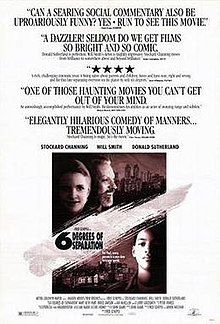Six Degrees of Separation (film)
| Six Degrees of Separation | |
|---|---|
 Theatrical release poster | |
| Directed by | Fred Schepisi |
| Screenplay by | John Guare |
| Based on | Six Degrees of Separation by John Guare |
| Produced by | Fred Schepisi Arnon Milchan |
| Starring | |
| Cinematography | Ian Baker |
| Edited by | Peter Honess |
| Music by | Jerry Goldsmith |
Production company | |
| Distributed by | Metro-Goldwyn-Mayer |
Release date |
|
Running time | 112 minutes |
| Country | United States |
| Language | English |
| Budget | $15 million[1] |
| Box office | $6.4 million[2] |
Six Degrees of Separation is a 1993 American comedy-drama film released by Metro-Goldwyn-Mayer and directed by Fred Schepisi, adapted from the Pulitzer Prize-nominated[3] John Guare play of the same name.
The plot of the film was inspired by the real-life story of David Hampton, a con man and robber who convinced a number of people in the 1980s that he was the son of actor Sidney Poitier. The writer John Guare was a friend of Inger McCabe Elliott and her husband Osborn Elliott. In October 1983, Hampton came to the Elliotts' New York apartment and they allowed him to spend the night. The next morning, Inger found Hampton in bed with another man and later called the police. The Elliotts told Guare about the story and it inspired him to write the play years later.[4][5]
Plot
Fifth Avenue socialite Ouisa Kittredge (Stockard Channing) and her art dealer husband Flan (Donald Sutherland) are parents of "two at Harvard and a girl at Groton". However, the narrow world inhabited by the Kittredges and their public status as people interested in the arts make them easy prey for Paul (Will Smith). A skillful con-artist, Paul mysteriously appears at their door one night, injured and bleeding, claiming to be a close college friend of their Ivy League kids, as well as the son of Sidney Poitier.
Ouisa and Flan are much impressed by Paul's fine taste, keen wit, articulate literary expositions and surprising culinary skill. His appealing facade soon has the Kittredges putting him up, lending him money and taking satisfaction in his praise for their posh lifestyle. Paul's scheme continues until, after he brings home a hustler, his actual indigence is revealed. The shocked Kittredges kick him out when it is revealed that they are but the most recent victims of the duplicity with which Paul has charmed his way into many upper-crust homes along the Upper East Side.
Paul's schemes become highbrow-legend, anecdotal onaccounta, which are bantered about at their cocktail parties. In the end, Paul has a profound effect on the many individuals who encounter him, linking them in their shared experience.
Cast
- Stockard Channing as Louisa "Ouisa" Kittredge
- Will Smith as Paul
- Donald Sutherland as Flan Kittredge
- Ian McKellen as Geoffrey Miller
- Mary Beth Hurt as Kitty
- Heather Graham as Elizabeth
- Bruce Davison as Larkin
- Richard Masur as Dr. Fine
- Anthony Michael Hall as Trent Conway
- Daniel von Bargen as Detective
- Eric Thal as Rick
- Anthony Rapp as Ben
- Oz Perkins as Woodrow ("Woody") Kittredge (as Osgood Perkins II)
- Catherine Kellner as Talbot ("Tess") Kittredge
- J. J. Abrams as Doug (as Jeffrey Abrams)
- Kitty Carlisle as Mrs. Bannister
Reception
Critical response
The film has an approval rating of 88% at Rotten Tomatoes based on 32 reviews, with an average rating of 7.12/10. The site's consensus reads: "Though it betrays its theatrical roots, Six Degrees of Separation largely succeeds thanks to astute direction and fine performances–particularly from an against-type Will Smith."[6]
Accolades
- 1994 Academy Award for Best Actress Nomination – Stockard Channing[7]
- 1994 Golden Globe Award for Best Actress – Motion Picture Musical or Comedy Nomination – Stockard Channing[7]
See also
References
- ^ Plunka, Gene A. (2002). The Black Comedy of John Guare. University of Delaware Press. p. 188. ISBN 9780874137637.
- ^ "Six Degrees of Separation". Box Office Mojo. Retrieved 2016-02-18.
- ^ "The Pulitzer Prizes". Pulitzer.org. Retrieved 2013-09-19.
- ^ New York Mag The Story of David Hampton accessed 7-27-2015
- ^ Gerston, Jill (6 March 1994). "Stockard Channing Goes West". The New York Times. Retrieved 2013-09-19.
- ^ Rotten Tomatoes
- ^ a b "THE 66th ACADEMY AWARD NOMINATIONS : Best Actress". Los Angeles Times. 1994-02-10. Retrieved 2016-02-18.
External links
- 1993 films
- 1990s comedy-drama films
- 1990s mystery films
- 1993 LGBT-related films
- American films
- American comedy-drama films
- American films based on plays
- American mystery films
- American satirical films
- American LGBT-related films
- English-language films
- Films about con artists
- Films about social class
- Films set in New York City
- Metro-Goldwyn-Mayer films
- Films directed by Fred Schepisi
- Films scored by Jerry Goldsmith
- 1993 comedy films
- 1993 drama films
